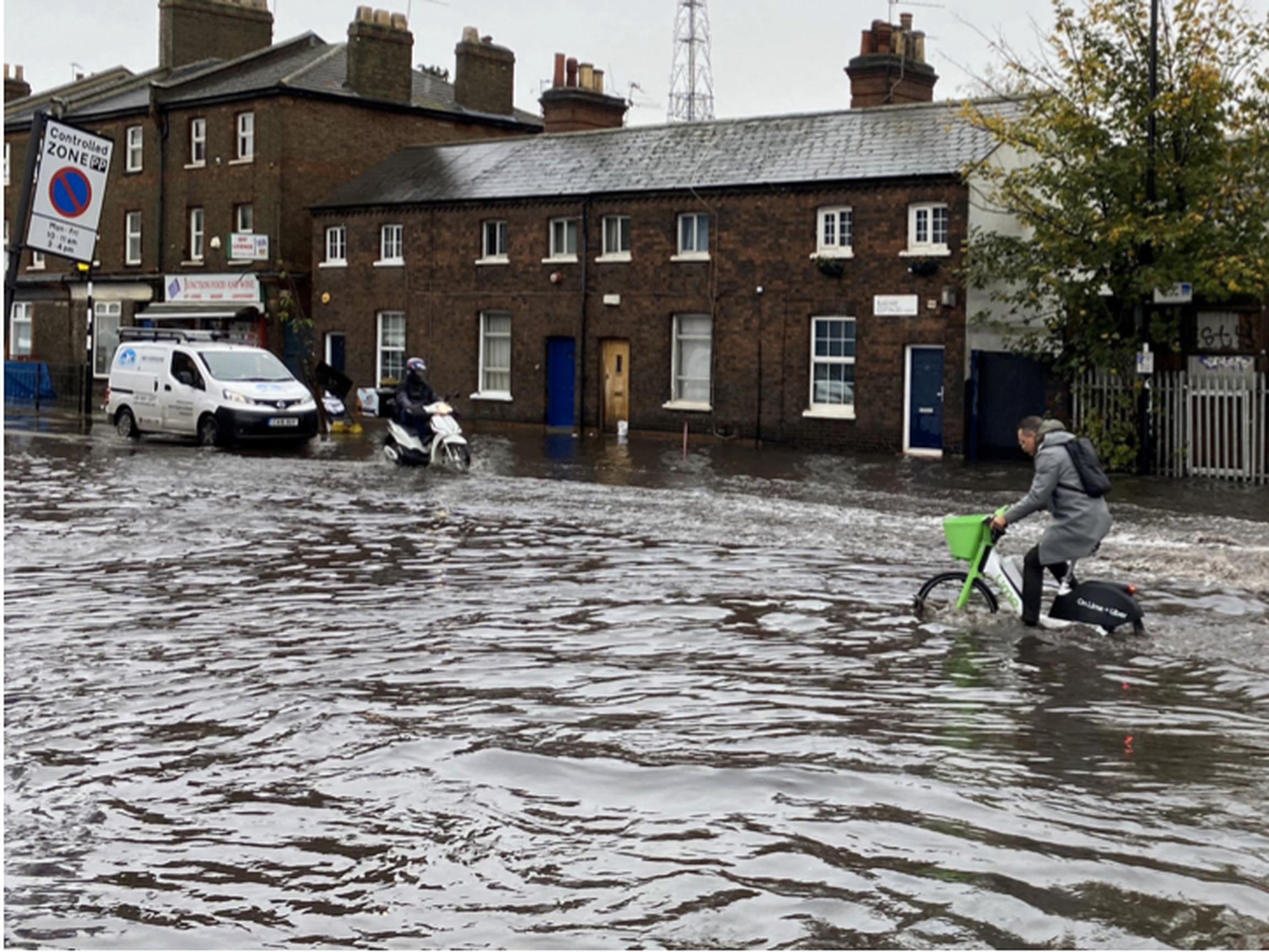

A report on how to tackle the growing challenges of flash floods and heatwaves in the capital has been submitted to the Mayor of London. In the wake of flash floods in 2021 and the 40-degree heatwave in 2022, Sadiq Khan commissioned the independent review to make recommendations to guide London’s preparations for more extreme weather.
Despite some progress in preparing for the impact of extreme heat and surface water flooding, London is underprepared for the frequency and severity of climate change currently experienced said the review team. A “step change” in adaptation planning and investment is needed to allow the capital to withstand the disastrous effects of climate change, such as more intense and frequent heatwaves, more intense rainfall, flash flooding and sea level rise, the review said.
The review gathered evidence from individuals, communities and organisations including the NHS, Transport for London, London Fire Brigade, the Metropolitan Police, Borough Councils, the GLA, UK Government, NGOs, the financial services sector, sports and cultural institutions as well as representatives of vulnerable groups.
It has now published an interim report, setting out hits key findings and recommendations, with a full report to be handed to the Mayor later this year. The final report will cover governance and climate adaptation; the built environment and supporting systems; communities and climate adaptation, and London’s economy.
Among 20 recommendations calling for strategic, delivery, capacity building or investment actions, the review urges Transport for London to share knowledge and best practice with industry stakeholders, such as Network Rail and Highways England, through the quarterly Transport Adaptation Steering Group.
Sadiq Khan should use his convening power to bring together Mayors from other UK cities with major transport infrastructure including roads, rail, trams and buses, and connect the Transport Adaptation Steering Group with transport providers and experts to share transport, says the review.
The team believe the Government should review mechanisms for funding surface water projects, taking into account the best mechanisms for cities. “London is an appropriate place to pioneer a new approach for urban areas: it is the smallest region in the UK by land area but with the highest population density and 33 separate Lead Local Flood Authorities all operating within the Thames catchment,” they said. “Of these, we understand that six currently don’t have a flood officer and outsource the work.”
The strategic, physical and governance problems are recognised by key actors in managing London’s surface water flood risk, the team noted. The London Surface Water Strategic Group is funded by organisations including TfL, the GLA, Thames Water, local authorities via local levy and the Thames Regional Flood and Coastal Committee. “This voluntary group shows that organisations can agree and be productive. To accelerate delivery a strategic approach should be embedded in law.”
Responding to events and repairing damage is much more costly than investing in adaptation and climate resilience, the review says. It calls for investment Nature Based Solutions, but notes that these projects can be seen as higher risk than grey infrastructure, which deters investors “who want immediate returns and expect governments to act as insurer of last resort”.
Sadiq Khan can play a “unique role in strengthening project development and take steps towards increasing mainstream finance for NBS projects”, the review says.
The review found that significant climate adaptation and resilience action is underway across London. Examples include the delivery of adaptation actions and plans for schools across London through the Climate Resilient Schools programme and the work with Boroughs and other stakeholders to develop London's first surface water flooding strategy plus a variety of programmes to better prepare London for hotter temperatures and heatwaves.
However, due to the degree of global heating which is projected a step change is needed the team says. “Current policies mean that the world is on track for a 2.5-2.9°C temperature rise above pre-industrial levels this century17 a rise that will have disastrous consequences and London is underprepared. Climate hazards are increasing in severity and frequency, and London faces significant risks including more intense and frequent heatwaves, more intense rainfall, the risk of flash flooding and sea level rise.”
Emma Howard Boyd CBE, Chair of the Review, said: “London has many good plans and programmes to prepare for climate hazards but we need to recognise that Londoners now face lethal risks, and a step change is needed. Last year was the hottest on record and this is causing chaos and disruption all over the world. London is not immune, as shown by the flash floods in 2021 and a 40-degree heatwave in 2022.
“I am really pleased that the Mayor has agreed to support an exercise to prepare for even more severe heatwaves than we saw in 2022. This is a positive step that will help London organisations plan to protect more Londoners in future shocks.
“In the absence of national leadership, regional government has a more significant role to play. We need pace not perfection. It’s time for the UK, led by its cities and regions, to take action and prioritise adaptation. That is an opportunity to make the UK economy more climate resilient, to protect the most vulnerable, to preserve all that we love about London and to show leadership to other cities nationally and globally.”

TransportXtra is part of Landor LINKS
© 2026 TransportXtra | Landor LINKS Ltd | All Rights Reserved
Subscriptions, Magazines & Online Access Enquires
[Frequently Asked Questions]
Email: subs.ltt@landor.co.uk | Tel: +44 (0) 20 7091 7959
Shop & Accounts Enquires
Email: accounts@landor.co.uk | Tel: +44 (0) 20 7091 7855
Advertising Sales & Recruitment Enquires
Email: daniel@landor.co.uk | Tel: +44 (0) 20 7091 7861
Events & Conference Enquires
Email: conferences@landor.co.uk | Tel: +44 (0) 20 7091 7865
Press Releases & Editorial Enquires
Email: info@transportxtra.com | Tel: +44 (0) 20 7091 7875
Privacy Policy | Terms and Conditions | Advertise
Web design london by Brainiac Media 2020